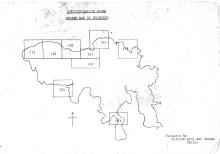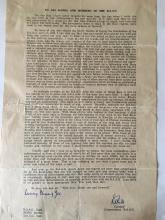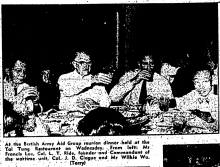The British Army Aid Group (BAAG) was a military intelligence unit which operated in China between March 1942 and December 1945, originally as a branch of MI9. The officers were mainly European men with a Hongkong connection, and the operative agents were mostly local Hongkong men and women who offered their services, often at great risk, in occupied Hongkong and outside, in the fight for the restoration of their home and freedom. Throughout the the war the BAAG provided unique intelligence - military, political and economic - about conditions in both Hongkong and China; they also gave medical and humanitarian assistance to civilians and military alike, and eventually were able to play a part in the restoration of legal rule in Hongkong.
Their role in Hong Kong during the war years is summed up very well in this editorial from the SCMP, dated January 15, 1946:
The B.A.A.G.
At the close of the year, Colonel L. T. Ride said good-bye to the men and women who have worked under him, in the British Army Aid Group, and this leave-taking marked the official end of an organisation that Hong Kong cannot allow to die. Tired memories still recall the desolation that overwhelmed us at the surrender. Then, recovering, for a time we toughened again, sure that the Allies would return very soon. Then hopelessness again, lapsing into despair. We came to regard ourselves a little bitterly as the forgotten folk—until we learned of the B.A.A.G. and the British Consul at Macao. There, miraculously, were friends, rallying round, beckoning us, assuring, us, impatient at times, no doubt, at the slowness of our response, venturing dangerously close, planning, providing, infiltrating at much risk—a resurgence and a rescue service almost without parallel. We did not know them then as the B.A.A.G. It was sufficient to know that Hong Kong men were on the perimeter, that we had not been abandoned at all: and thousands who were able to get away have full cause for gratitude to the B.A.A.G. for ready, generous and efficient help.
The work done by the B.A.A.G. was very varied, ranging from espionage organisation, and other contact-making, to the assistance of refugees and displaced persons, conveyance of news to anxious relatives and friends, and even including “scorched earth” service when the enemy invaded the interior bases. The B.A.A.G. was so well organised and so well served that the knowledge abroad of conditions in Hong Kong was remarkably accurate and up-to-date. Though in conventional sense not a combat unit, its work, in the advanced sections, was highly dangerous. It is known now that many of its messengers and its agents in Hong Kong were caught and savagely put to torture and death. Their names will live in our minds and hearts; and when the full story of the B.A.A.G. is written its roll of honour will be a tablet to treasure. In its leader the Hong Kong unit was fortunate. Able, familiar with the Colony, and blessed with personality. Colonel Ride was a most appropriate choice. He is also well qualified to be the official historian, and his book will be awaited with keenest interest.
To this Colony the essential virtue of our part of the B.A.A.G. is that it was Hong Kong. There is rivalry between interned and non-interned as to which section was the custodian of the Hong Kong spiritual relics. If there were during the occupation two Kong Kong marooned here, there was a third Hong Kong outside—another Hong Kong fretting, worrying and grieving. Nor did its work cease abruptly with the war’s end: for four months the personnel have been here helping to mop up the post-war problems, dealing sympathetically with a host of domestic wants and participating in the avenging of unnecessary sufferings. The unit’s record of service is one for Hong Kong’s pride as well as its gratitude. There is another aspect which should not bo overlooked. It is an old taunt that Kong Kong is not China and knows little of China. The Hong Kong folk who escaped, and those who returned from elsewhere to work with the B.A.A.G., have in appreciable degree removed that blemish. They now know China. They laboured in close association with the real Chinese, reaching understanding. They return as an embassy, and they have a further service to perform in educating Hong Kong to a more co-operative conception of things Chinese. It will be a great pity if the B.A.A.G. should be completely dispersed: it has earned its shrine of remembrance and there is still work that it could do.


